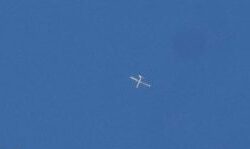Beirut, Lebanon — The night fell heavy over the south of Lebanon, where shadows danced under the relentless roar of Israeli planes. It was the most intense barrage the region had seen in a year, a devastating reminder of the fragile line between peace and war. The land trembled, though no bodies had yet been counted. Across the globe, in rooms where calm voices often fail, calls for peace grew louder, yet the guns still spoke.
A Line Crossed, A Nation Trembles
In a land where the sun once kissed olive trees with tender light, now fear and fire carve deeper scars. Israel’s military unleashed a rain of attacks on over a hundred rocket launchers, each poised to strike their homeland. The night sky was lit with the fury of more than fifty airstrikes, each echoing a silent prayer of survival. Meanwhile, the people waited. The land, scarred but defiant, remained silent, holding its breath as no casualties were reported.
Hezbollah’s leader, Hassan Nasrallah, the face of defiance for many, spoke softly but with a firmness that carried across oceans. He called it a “severe blow” — an attack not just on a battlefield, but on the very soul of his movement. Israel had crossed a line, he said, one drawn long ago in the sand of war and blood. And though the rockets had not yet flown, the memory of destruction hung thick in the air.
The Hidden Hands of Mossad
The world watched, some from afar, others with fear and trembling. In Washington, London, and Paris, voices rose. The White House, the seat of so much power, shuddered at the thought of escalation. They urged diplomacy, a path so often paved with good intentions but so rarely walked with conviction. Karine Jean-Pierre, with words clipped yet weighed, spoke of worry and hope for a resolution before the storm grew stronger.
But in the streets of Beirut, whispers swirled of another kind of war — the war fought in silence, with secrets and shadows. Hezbollah’s fighters, proud and steadfast, had been attacked not with bombs, but with devices meant to communicate — walkie-talkies, pagers, things of another time but still essential in their hands. Explosive death had come not from the skies, but from within their very tools.
Speculation spread like wildfire — was it Mossad, Israel’s elusive arm of intelligence, who had planted the seeds of this destruction? Reports from near and far pointed to a plot, carefully crafted. There were murmurs of a company, a front hidden in Budapest, quietly manufacturing these lethal pagers. But the truth, as always, was a fog rolling in from the sea — unclear, yet undeniable in its weight.
The World’s Plea for Peace
The people of Lebanon, as they always do, tried to carry on. Yet, the air felt different. In the markets, on the streets, the talk turned to survival. At Beirut’s airport, passengers were now barred from bringing pagers or walkie-talkies aboard their flights, a grim reminder of the danger that no longer hid in plain sight.
In the hallowed halls of international diplomacy, the calls for peace grew desperate. In the cool, stately rooms of Paris, David Lammy, the UK’s foreign secretary, pleaded for an immediate ceasefire. “There must be peace,” he said, his voice ringing out like a prayer in the night. “For the people of Israel. For the people of Lebanon. Let them return to their homes, to their lives.”
But peace, ever elusive, hung in the balance. As Israel’s Defense Minister Yoav Gallant spoke with his American counterpart, Lloyd Austin, the words of solidarity came strong and sure. Israel would be defended, the threats of Hezbollah and its Iranian backers would be met with equal force. Yet even Austin, in his power, understood that the fires of war, once lit, are not so easily quenched.
A War of Shadows and Light
And so the world watched, hearts clenched in fear, but eyes turned toward the faintest flicker of hope. For in the land of Lebanon, where the cedar trees once stood as silent witnesses to both peace and pain, the people knew that war does not come like a thief in the night. It comes in waves, each one threatening to drown what remains.
Yet, even in this storm, there is light. In the words of those who call for peace, in the actions of those who seek to preserve life, there remains a chance, however small, that diplomacy might win. That the roar of the planes might one day give way to the quiet hum of rebuilding. That the people, caught in the crossfire of history, might one day lay down their fears and live again in peace.
For now, though, the night is dark. And the sky, heavy with the smoke of war, waits to see if the dawn will bring more fire or the longed-for light of peace.


